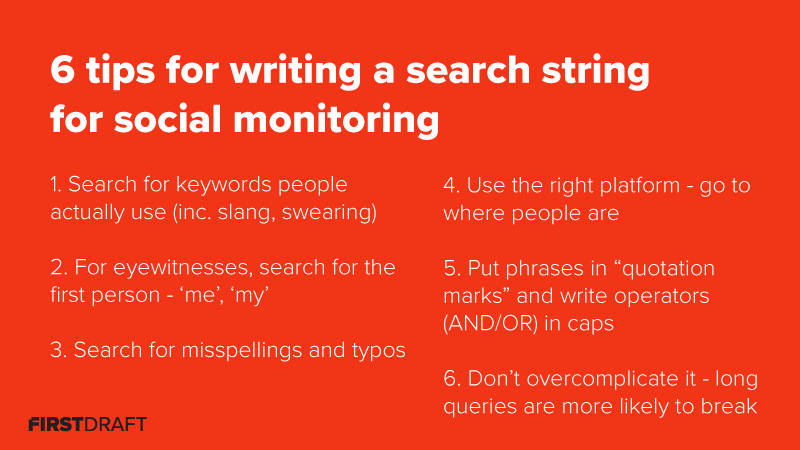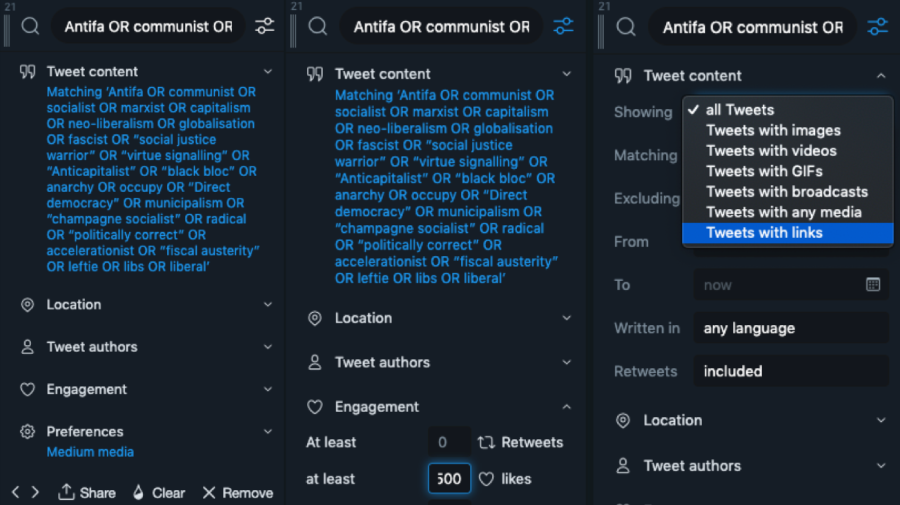Once you know the basics of constructing social searches, the next challenge is learning how to find the most newsworthy posts.
Often you’re looking for a needle in a haystack, scouring through social media posts for that one piece of eyewitness media or the original posting of viral disinformation. This only becomes more difficult during breaking news events, when the volume of posts about a topic can become mind-bogglingly large.
In this guide, we cover 6 tips for finding that needle in the social media haystack.
For how to construct a Boolean search, view our Boolean Basics guide.

- Search for keywords people actually use
The keywords are, well, key. You need to search for the terms that are going to be in the relevant posts. To get the right ones, you need to do research and be creative – but there are some pointers that will help.
First, you want to search for words within the local language contexts – either national languages or community-based slang and jargon. Rather than searching for ‘far right’ or ‘far left’, terms used by commentators rather than community members, you could consider terms like ‘msm’ (mainstream media).
- For eyewitnesses, search for the first person – ‘me’, ‘my’
Second, you could consider how language will be deployed situationally – what will people be saying who are actually present in a situation, for example, and how does this differ from people commenting from afar? Putting yourself in the shoes of the people present in a situation, and how they would express their experience, will help find sources and eyewitness media.
Sometimes this is as simple as searching for the first person, like ‘me’ or ‘my’, which help to find people relaying personal experiences.
- Search for misspellings and typos
An extension of that point is to think about different iterations of the keywords you’re searching for. In practise, this often means typos and misspellings.
In some cases this will be more important than others – tourists, for example, are more likely to get local names wrong or write in localised (eg Anglicised) versions of them.
- Use the right platform
There are two considerations when it comes to platform: where are the people you want to hear from, and what kind of search the platform allows.
Twitter has an enormous amount of real-time posts that are highly searchable, and it’s a place where people go to report on breaking news and voice their political opinions. Twitter has an advanced search function which includes tips on Boolean operators, making things a little easier.
A lot of the world isn’t on Twitter, though. Facebook is a huge network where a lot of newsworthy activity happens – the catch is that most of it is private and therefore not searchable, and recently a lot of the tools that journalists could use to search it have been shut down by Facebook.
If you’re looking for specific people or sources, LinkedIn can be a good option. Recruit’em can help you put together a more precise Google search that will pull through relevant pages on LinkedIn.
- Put phrases in quotation marks, and check other syntax errors
Searches that use Boolean operators require lots of precise syntax. Here are the things to remember:
- Operators (AND/OR/NOT), which we explain in our introduction to boolean newsgathering, must be written in uppercase or they won’t work
- Phrases – search terms that combine multiple words, like “mainstream media” – must be written in “quotation marks”
- All brackets that are opened must be closed, or the string will break
- Don’t overcomplicate it – long queries are more likely to break
As you refine your approach, there’s a good chance you’ll be adding more complexity to your search string. This often results in lots of parentheses and increasingly long strings.
Adding complexity can help save time in the long run and find that crucial post that helps a breakthrough in an investigation. But if it gets too long and complex, errors become more likely and harder to spot. Try to keep them short.
This guide appears as part of a week-long series on social media search queries. To stay informed, become a First Draft subscriber and follow us on Facebook and Twitter.






